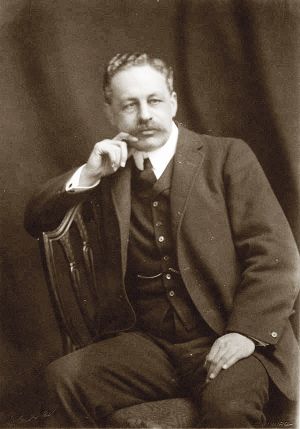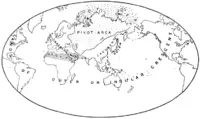Halford Mackinder
Sir Halford John Mackinder PC (February 15 1861 – March 6 1947), was an English geographer and geopolitician.
He was educated at Queen Elizabeth's Grammar School, Gainsborough (now Queen Elizabeth's High School), Epsom College and Christ Church, Oxford, and specialised as a physical geographer, later branching into economics and political theory, arguing that physical and human geography should be treated as a single discipline.
Work and achievements
- In 1887 he was appointed Reader in Geography at the University of Oxford, then by far the most senior position for a British geographer, announcing: "A platform has been given to a geographer." By 1899 he had drawn together a single School of Geography.
- The climbing of Mt. Kenya in 1899.
- In 1902 the publication of "Britain and The British Seas", which included the first comprehensive geomorphology of Britain, and in which he described Britain as 'a lump of coal surrounded by fish'.
- In 1895, he was one of the founders of the London School of Economics.
- He was a member of the Coefficients dining club of social reformers set up in 1902 by the Fabian campaigners Sidney and Beatrice Webb.
- In 1904 Mackinder gave a paper on "The Geographical Pivot of History" at the Royal Geographical Society, in which he formulated the Heartland Theory. This is often considered as a, if not the, founding moment of Geopolitics, as a field of study, although Mackinder did not use the term. Whilst the Heartland Theory initially receiving little attention outside geography, this theory would influence the foreign policies of world powers ever since.
- He helped found the University of Reading in 1892, and the Geographical Association in 1893 which promoted (and promotes) the teaching of geography in schools. He was GAs chair from 1913 to 1946 and President from 1916.
- He was knighted in 1920.
Possibly disappointed at not getting a full Chair, Mackinder left Oxford and became director of the London School of Economics between 1903 and 1908. After 1908, he concentrated on advocating the cause of imperial unity and only was involved in lecturing part-time. He was elected to Parliament in January 1910 as Unionist Party member for the Glasgow Camlachie constituency and was defeated in 1922.
His next major work was in 1919 - Democratic Ideals and Reality - was a perspective on the 1904 work in the light of peace treaties and Woodrow Wilson's idealism. This contains his most famous quote: "Who rules East Europe commands the Heartland; Who rules the heartland commands the World Island; Who rules the World Island commands the World." This message was composed for world statesmen at the Treaty of Versailles; the emphasis on East Europe as the strategic route to the Heartland was interpreted as requiring a strip of buffer state to separate Germany and Russia. These were created by the peace negotiators bu proved to be ineffective bulwarks in 1939. Although Mackinder was anti-Bolshevik (as British High Commissioner he tried to unite the White Russian forces), the principal concern of his work was to warn of the possibility of another major war (a warning also given by economist John Maynard Keynes).
Enter the Nazis
The Heartland Theory was enthusiastically taken up by the German school of Geopolitik, in particular by its main proponent Karl Haushofer. Whilst Geopolitik was later embraced by the German Nazi regime in the 1930s, Mackinder was always extremely critical of the German exploitation of his ideas. The German interpretation of the Heartland Theory is referred to explicitly (without mentioning the connection to Mackinder) in The Nazis Strike, the second of Frank Capra's Why We Fight series of American World War II propaganda films.
The importance of Mackinder
Mackinder's work paved the way for the establishment of geography as a distinct discipline in the United Kingdom. Oxford would not appoint a Chair until 1934, but the University of Liverpool and University of Wales, Aberystwyth both appointed Chairs in 1917. Mackinder was given a personal chair at the London School of Economics in 1923. His role in fostering the teaching of geography is probably greater than any single British geographer.
Mackinder on geography
"The science whose main function is to trace the interaction of man in society and as much of his environment and as varies locally."
"The science of distribution. The science, that is, which traces the arrangement of things in general on the Earth's surface." Mackinder is also credited with introducing two new terms into the dictionary : "manpower" , "heartland".
External links
- Mackinder biographical entry at the London School of Economics
- Political Geography (Taylor, 1989)
| Parliament of the United Kingdom | ||
|---|---|---|
| Preceded by: Alexander Cross |
Member of Parliament for Glasgow Camlachie 1910–1922 |
Succeeded by: Campbell Stephen CreditsNew World Encyclopedia writers and editors rewrote and completed the Wikipedia article in accordance with New World Encyclopedia standards. This article abides by terms of the Creative Commons CC-by-sa 3.0 License (CC-by-sa), which may be used and disseminated with proper attribution. Credit is due under the terms of this license that can reference both the New World Encyclopedia contributors and the selfless volunteer contributors of the Wikimedia Foundation. To cite this article click here for a list of acceptable citing formats.The history of earlier contributions by wikipedians is accessible to researchers here: The history of this article since it was imported to New World Encyclopedia: Note: Some restrictions may apply to use of individual images which are separately licensed. |

